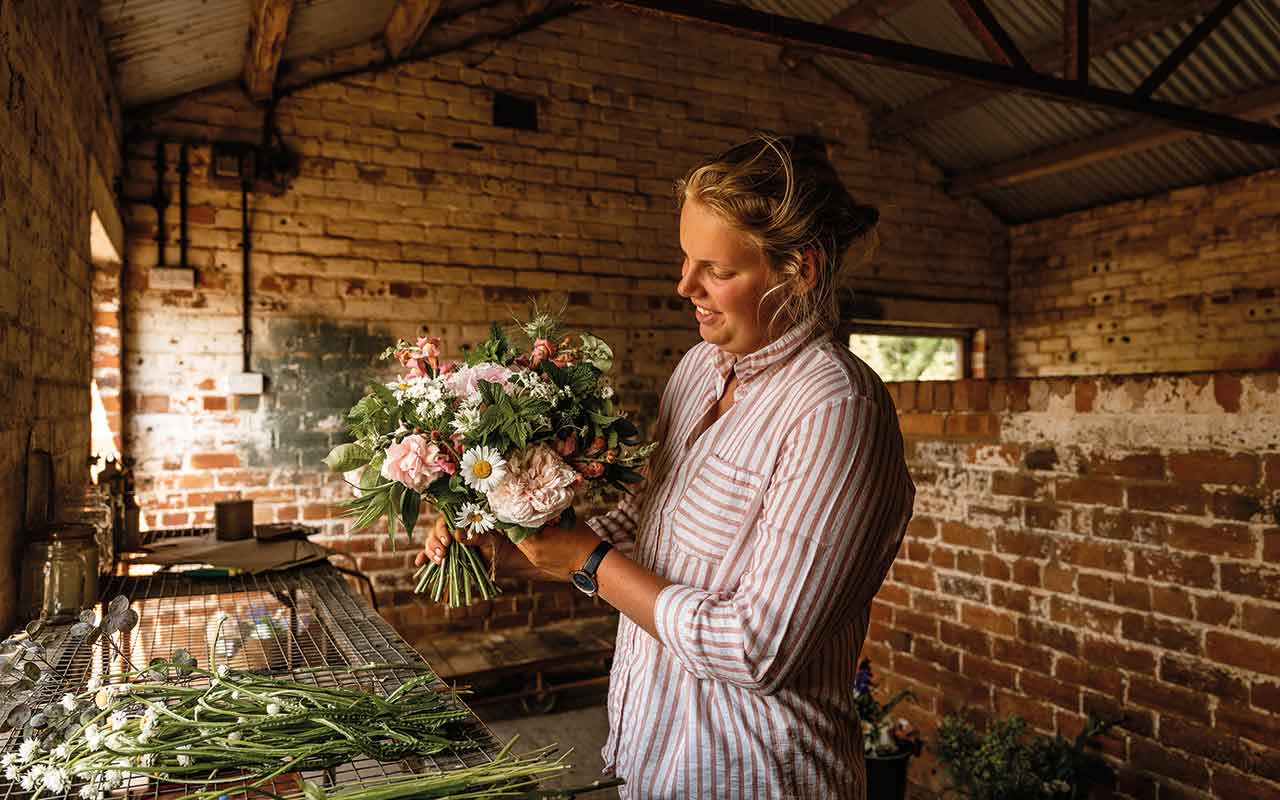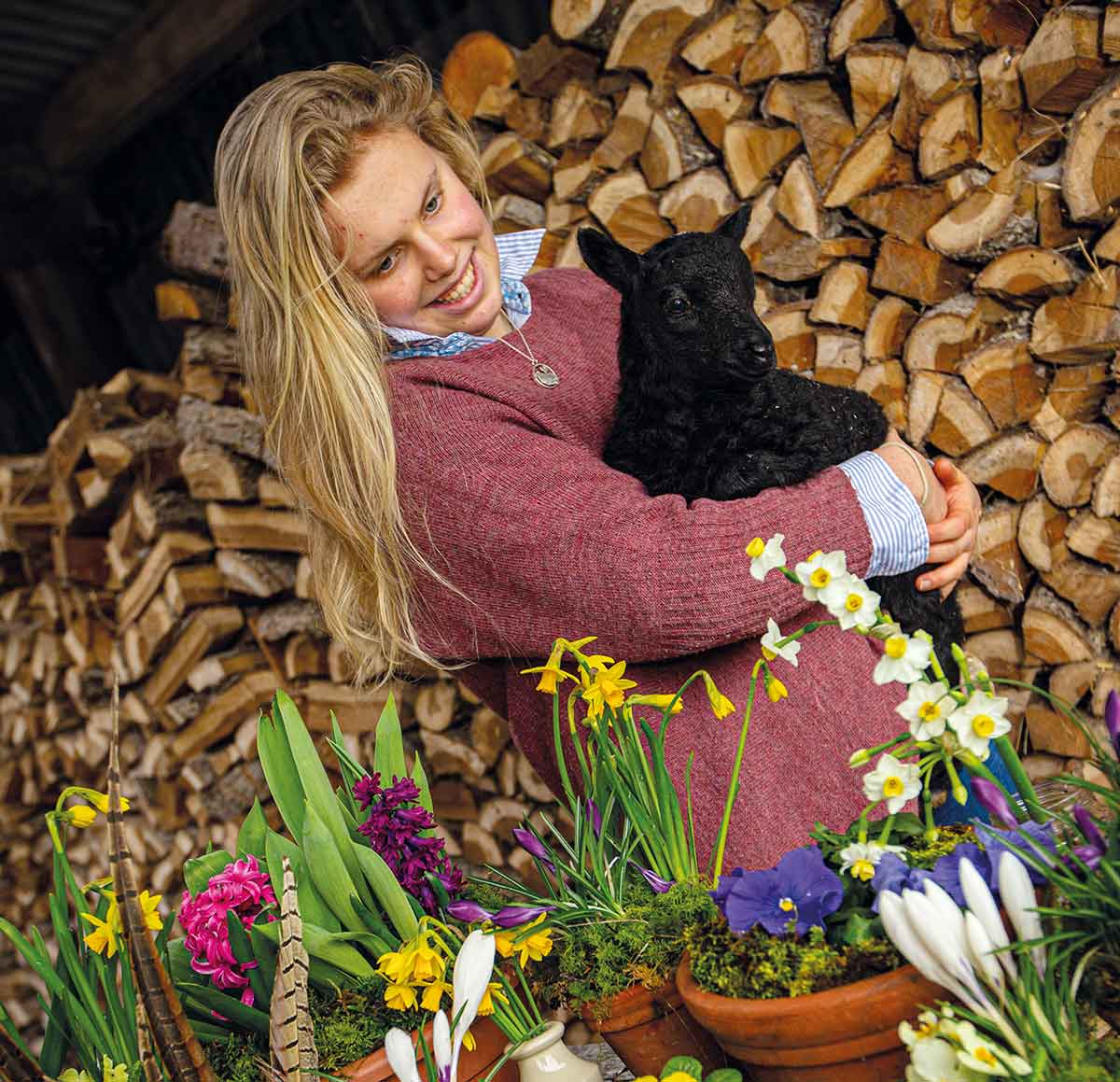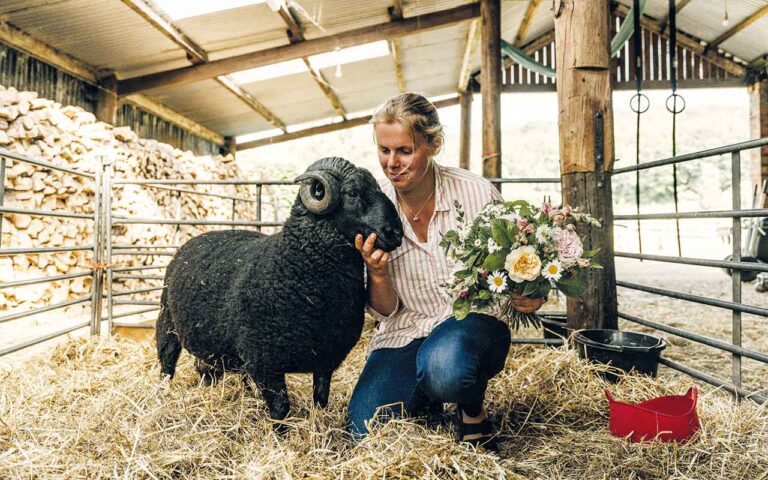The focus on farming sustainably has led many producers to look within to find by-products or inputs that can be used more efficiently. For new entrants into the sector, it can be a source of opportunities, such as our 2025 Sustainable Farm Award winner Ellen Firth.
With limited opportunities to expand the family smallholding, located just outside of Ruthin, Ellen instead looked at the 33 pedigree Black Welsh Mountain breeding ewes and how they could be used in the growing of a crop.
“Agricultural land is so expensive that it meant I was always going to struggle to expand the flock, so my focus turned to a high-margin crop that would maximise the space,” Ellen explains.
Flowers stood out to her because they were a high-margin, low-input option, with a direct-to-consumer market that could be established locally.
“I’d grown flowers and vegetables in our garden during lockdown, so I knew the basics and could scale that up,” she says.
She has transformed a small area of scrubland, filled with docks and thistles, into a viable plot. Running over the ground with a shallow rotovator created a seedbed and the worst half of the area was covered with plastic to keep the weeds at bay.
The rest of the ground was weeded by hand and sown in 1.2m beds, spaced 0.6m apart, with flowers planted with 20cm spacings.
Muck from the sheep flock, along with a mulch based around the wool was used to provide nutrients, while a small number of Welsh Harlequin ducks were put into the patch to handle pest control.
It has meant that Ellen has been able to grow more than 200 varieties of flowers organically, although the business isn’t certified as such.

Looking for an entry point
At just 21 years old, Ellen has built up a profitable, fast-moving business. It’s not exactly the agricultural business she envisioned when growing up in Lincolnshire, but it has given her a step on the farming ladder.
“We’ve always lived rurally, but when we were in Lincolnshire, our neighbour’s dairy cows used to come right to our garden,” she explains.
Having caught the farming bug, she started working on local farms before and after school, and when the family moved to Ruthin in 2019, the local college allowed her to complete an agricultural diploma alongside her GCSEs.
While in Ruthin, the family invested in the sheep flock and quickly earned a reputation at local shows. This enabled them to sell breeding stock to other farmers across the country, as well as creating an additional income stream by selling lamb direct to a local hotel and restaurants.
Costs are kept down as Ellen has learned to shear and show trim the animals herself.
While the flowers represented a low-input option to maximise the space available, Ellen required some help to get the business, Firth Flock Flowers, up and running.
“I applied for a Young Person’s Start-Up Grant and received £2,000,” she says. “This was incredibly helpful, as at the time I didn’t even have a laptop so couldn’t consider setting up a website or promoting my business.”
Once the first crop of flowers was ready to be picked, Ellen set about maximising the potential income. Using YouTube tutorials, she taught herself to make flower arrangements and started selling them locally for events.

Sustainable from the ground up
While sustainability may appear to be something forced on Ellen’s business due to the scale, it feeds into everything she does.
Once she started making flower arrangements, she was careful to limit the environmental impact. No floral foam is used due to the damage microplastics can do to watercourses; instead, arrangements are put together using compostable materials.
“I encourage all my customers to either compost the materials themselves, or to return them to me for a discount. This includes pottery and vases,” she says.
Green waste and any leftover packaging are composted on the farm as well. Ellen notes that one of the advantages of flowers is that they tend to prefer a lower pH and organic matter than many other crops. This means the compost doesn’t have to be tailored to the different flower types.
As the business has grown, Ellen, who has autism and ADHD, has received funding to hire a personal assistant who helps manage orders and the events schedule, as well as assisting her with promotional activities, such as the website.
While the bulk of her customer base has remained local, with events such as weddings providing a large proportion of this, Ellen has also started delivery nationwide through Royal Mail, with flowers packaged in fully compostable materials.
When certain varieties are required, or if Ellen doesn’t have the flower requested, she purchases additional stock from UK growers, doing her best to source organically grown, sustainable flowers.
“I also work with local potters to provide additional parts of the arrangements,” she says.
The future in bloom
Expansion is already on the cards for Ellen, who is in the process of sowing the second half of the plot now that the plastic has been removed. As well as the annual varieties she grows, she is adding perennials and shrubs to the plot, ensuring that more of the arrangements are grown in-house.
She is also finding new ways to add value to the business, offering workshops on flower arranging and increasing the number of events she attends to promote Firth Flock Flowers.
She adds that the business is at a level where she is seriously considering looking for additional ground, not just to increase the flower area, but to facilitate a larger sheep flock and perhaps the inclusion of cattle.
“I miss working with the cattle, and it would be nice to have some Welsh Blacks – another hardy breed that will pretty much look after themselves,” she explains. “The problem is the availability of land, though.”
While flowers are hardy and relatively unfussy about soil type, they are vulnerable when sown on exposed areas, so while Ellen could perhaps settle for lower-quality ground, it would need to be sheltered. “I’d also need access to water for the animals wherever I moved. It’s less of a concern for the crops, as there is ample moisture in the soil because we’re not digging after each harvest.”
She admits she was surprised to have won the Sustainable Farming Award, especially given the stiff competition in the category.
When asked if there is anything about her business that could be scaled up and applied to larger agricultural companies, she says: “It’s about looking at the value you already have on farm and designing new income streams around that.
“I’m constantly looking at what I’m doing, reassessing it and finding new ways to increase the margins. I’m just doing it with a different crop, and at a different scale.”


